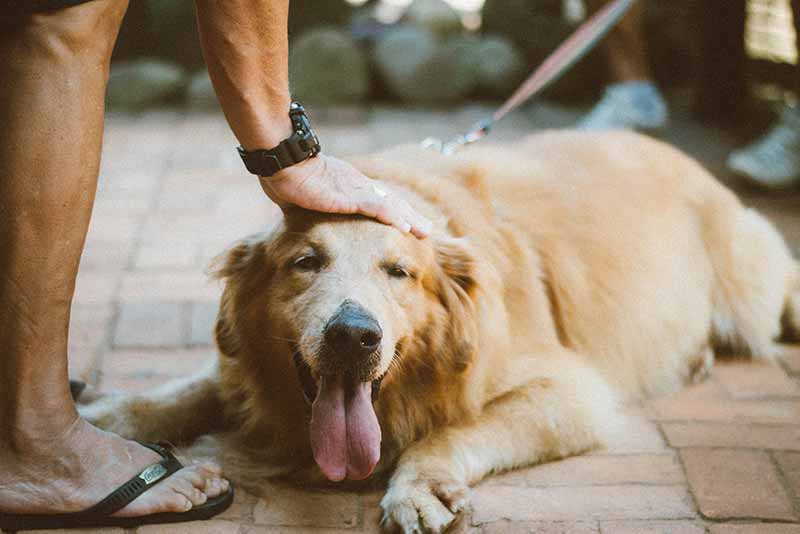My Dog Lays Down And Refuses To Move; Why?
Sometimes, despite how close you are to your pet, you cannot read what they imply, especially their sudden behavior change. They could come and go abruptly, catching you off-guard. So, it will be rewarding if you at least know a bit about how to handle your doggo in these situations.
If you’re concerned about these unexpected mood changes in your canine, this article will help you in one such case.
So, Why does your dog lay down and refuse to move? This behavior often implies that your doggo is tired, not having fun, or feeling sick. Liver diseases, neurological disorders, and problems in sight or hearing are a few medical problems that can cause your canine to behave that way.
Often I have noticed this in my dachshund whenever I put his leash on. So, after trying many times since he was a puppy, I eventually stopped using the leash.
He’s well behaved and listens and obeys my command. So I know now that my doggo enjoys his walks without a leash, constantly tugging on his neck.
But that’s just one reason for the behavior we’re talking about today. So let’s check out what other reasons make your dog lays down and refuses to move.
Why Does My Dog Lay Down And Refuse To Move?
Knowing our pet very well, you and I can spot out as soon as something is wrong with him; the main point is his behavior changes. Whenever he does something out of the ordinary, we know that he’s having a problem.
So now, let’s see why he does what he does.
- He’s Not Having A Great Time
Whenever a dog lays down and refuses to move, there’s a high chance he’s not enjoying whatever he’s doing. It mainly happens during training.
If he’s not interested or is uncomfortable during the session, your doggo will behave this way. It could also mean that your dog doesn’t like his trainer. What a picky dog he is, isn’t he?
- Your Canine Might Be Feeling Tired
There’s a small park near my house where I often take my pet. We have to walk a fair share of distance to get there. Once there, we will play fetch and a few other games.
But my doggo, being 12 years now, gets tired pretty quickly and cannot play the way he used to. He’ll come to me and lay down and is dead set on not moving an inch whenever he’s tired.
However much I tried to get him to play some more, he refused. But as soon as I say, “let’s go home” he understands and gets up, eager to end his exercises for the day.
So what I understood by that is it’s one way that canines show that they are tired.
- He Could Be Sick
Naturally, anyone would like to lay down and stay whenever they’re sick. It’s the same with our furry friends as well.
He could be experiencing problems with his eyesight, neurological disorders, liver problems, or even arthritis in his bones. If you’re ever in doubt that your friend might be sick, take him to see the vet as soon as possible.
The next possibility of why your dog lays down and refuses to move is that he’s lazy; maybe he’s not feeling up to it and wants to lay down.
A stubborn dog might change his mind if you show him a treat, but this could influence your pet negatively.
What Does It Mean When A Dog Doesn’t Want To Move?
Your pet’s only way of explaining his emotions to you is his behavior. So if you know your canine’s every move, you’ll quickly see red flags.
Whenever he does something unusual, like when your dog lays down and refuses to move, its meaning might change according to the situation.
Hence, reading the situation correctly before taking action is highly necessary and solely up to you.
If your dog refuses to move, it can indicate that he’s tired, lazy, feeling ill, or doesn’t like doing whatever you want him to do.
Therefore, there are many options to choose from, and selecting the right one is your responsibility.
So, if you think that you need to seek medical advice for your pet, you must take immediate action. Or else, if you tend to what your doggo is asking, he’ll back up and become his usual self.
Maybe your pet needs some water or to catch his breath. It depends on how smart you are at reading the situation. If the canine keeps laying down and refusing to move continuously, then it’s time you see the doctor.
How Can I Move My Dog Without Hurting?
Sometimes, when your dog lays down and refuses to move, you need to move him somehow. But you cannot push him or pull him from his collar or the leash.
It could even hurt him, making his protest even stronger. He might refuse to move because he’s lazy, stubborn, scared, attention-seeking, or sick.
So let’s see how you get him moving again.
- First, if your doggo stopped in the middle of a walk, sit down for a minute with him. Talk to him calmly and praise him, asking him to be a good boy. After assessing the environment, your doggy will let you know he’s ready to walk again. Moreover, try giving him some water. He might be thirsty.
- Praise him more when he’s getting back up. Don’t try to lure your dog forward with treats. that negative influence might be exactly how you ended up in this situation.
- If you have a leash on your dog, walk to the rope’s end and kneel. Talk to your pet and ask him to come towards you. Give him a command such as “let’s go or come here” and if he responds well, give him a treat.
Above are only a few techniques to get fearful, stubborn, or lazy dogs to walk. But if you feel like your pet is experiencing pain when trying to walk, feeling paralyzed, or has arthritis, and the situation can not be recovered, you will have to lift him to move. The best thing is to seek medical attention right away.
Thank you for reading this post. Stay tuned with Jack Russell Owner for more interesting posts.








